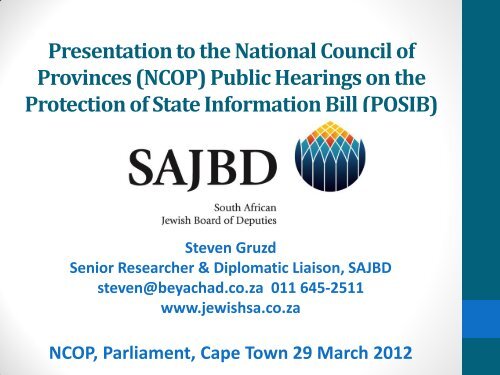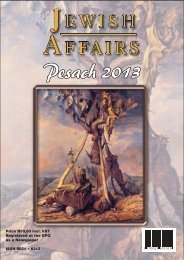POSIB - South African Jewish Board of Deputies
POSIB - South African Jewish Board of Deputies
POSIB - South African Jewish Board of Deputies
- No tags were found...
Create successful ePaper yourself
Turn your PDF publications into a flip-book with our unique Google optimized e-Paper software.
Presentation to the National Council <strong>of</strong>Provinces (NCOP) Public Hearings on theProtection <strong>of</strong> State Information Bill (<strong>POSIB</strong>)Steven GruzdSenior Researcher & Diplomatic Liaison, SAJBDsteven@beyachad.co.za 011 645-2511www.jewishsa.co.zaNCOP, Parliament, Cape Town 29 March 2012
Proposed further changes4 key areas for proposed furtheramendments to <strong>POSIB</strong>:1. Removal <strong>of</strong> minimum sentences2. Removal <strong>of</strong> negligence as sufficientform <strong>of</strong> mens rea3. The criteria4. Public interest defence
1. Minimum sentences• Minimum sentences prescribed are excessive, makes itdifficult for courts to judge fairly on merits• Support removal <strong>of</strong> minimum sentences from <strong>POSIB</strong>, leaveseverity <strong>of</strong> punishment to courts• Affects sub-clauses 36(1), 36(2), 36(3)• While 36(4) grants the Court authority to impose a lessersentence, open discretion without having to provide“compelling circumstances” would serve justice best• Each case could then be judged objectively, according toits particular circumstances• In conformance with best practice, modern jurisprudence
2. Remove negligence assufficient form <strong>of</strong> mens rea• Security <strong>of</strong>fences are traditionally connected to anintention to overthrow the state, includes doluseventualis – possibility <strong>of</strong> consequence orcircumstance is foreseen, but reckless disregard towhether it ensues or not. The actor “not caring”• No rational reason why such statutory <strong>of</strong>fencesshouldn’t be limited to intentional contraventions• Emphasis lies in intention and desire to subvert thestate, and not in mere negligence - insufficient inthis context• Jailing for negligence would be extraordinary
3. The criteria• <strong>POSIB</strong> has indeed amended many “overbroad” criteria• C12 protection <strong>of</strong> state security at heart <strong>of</strong> legislation, needsto be distinguished from mere political or individual interest1. C1 defines “national security” – key for any state• C1 ‘“national security” includes … ’ - creates impression thatadditional, undefined criteria could be chosen• Constitutional Court has given strict guidelines on this phrase• Substitute “includes” with “means” to prevent wider authority to<strong>of</strong>ficials than intended2. Point (v) “Exposure <strong>of</strong> economic, scientific or technologicalsecrets vital to the Republic” is Constitutionally overbroad;other criteria in section would take care <strong>of</strong> these interests
3. The criteria (cont)3. Cl 14(3) d,e,f: “Specific considerations with regard to thedecision whether to classify state information may includewhether the disclosure may (d) seriously and demonstrablyimpair relations between <strong>South</strong> Africa and a foreigngovernment, or seriously and demonstrably undermineongoing diplomatic activities in the Republic; (e) violate astatute, treaty or international agreement, including anagreement between the <strong>South</strong> <strong>African</strong> government andanother government or international institution; (f) causelife threatening or other physical harm to a person orpersons”• When related to national security, these concerns are alreadycovered in the definition, so need not be addressed separately• As stated, could also be used to classify information notrelated to national security - overbroad and unconstitutional
3. The criteria (cont)• Rule <strong>of</strong> Law, a foundational value <strong>of</strong> our Constitution,requires legislation to be clear, accessible, understandable• Submission cites several cases, Constitutional Courtjudgments to show that overbroad legislation is consideredunconstitutional and will then be invalidated by the Court• Also judgments by Chaskalson, Langa, Mokgoro, Mogoeng,on unacceptability <strong>of</strong> arbitrariness, narrow tailoring inlegislation• Vague language considered unconstitutional as too opento subjective interpretation (e.g. “indecent” and “obscene”on child pornography). Context always matters!• Constitution requires “objective rationality” for validity <strong>of</strong>laws granting powers to <strong>of</strong>ficials
3. The criteria (cont)• “The requirement <strong>of</strong> rationality is not directed at testingwhether legislation is fair or reasonable or appropriate. Nor isit aimed at deciding whether there are other or even bettermeans that could have been used. Its use is restricted to thethreshold question whether the measure … is properly relatedto the public good it seeks to realise. If the measure fails onthis count, that is indeed the end <strong>of</strong> the enquiry. The measurefalls to be struck down as constitutionally bad.” (Moseneke)• “Our Constitution instructs that no law may limit afundamental right, except if it is <strong>of</strong> general application and thelimitation is reasonable and justifiable in an open anddemocratic society.” (Moseneke)• “It is an important principle <strong>of</strong> the rule <strong>of</strong> law that rules bestated in a clear and accessible manner. It is because <strong>of</strong> thisprinciple that s 36 requires that limitations <strong>of</strong> rights may bejustifiable only if they are authorised by a law <strong>of</strong> generalapplication. “ (O’Regan)
3. The criteria (cont)• The Constitutional Court has had to decide on “overbroad”legislation regularly. Where criteria go wider than protectionwhich is Constitutionally reasonable (see S36) the legislativeprohibitions which follow are also unconstitutional and invalid• If legal criteria are bad in law, they cannot be cured or madeConstitutional by either creating an <strong>of</strong>fence (e.g. C47 onintentionally classifying info illegally), or the possibility <strong>of</strong>whistle-blowing, or permission by the Director <strong>of</strong> PublicProsecutions to prosecute• Therefore unnecessary, Constitutionally overbroad to isolateor mention these interests (e.g. airfields or Parliament notmentioned, but not excluded from national securityprotection. And strict guidelines C14)
3. The criteria (cont)• Therefore remove subclause 14(3) (d), (e) and (f)• Existing criteria, if properly applied, would coversecurity risks in connection with these matters• Leaving these clauses in opens the law to misusein cases not related to state security• Bill stands to be invalidated as overbroad unless“impair national security” is added to each <strong>of</strong>these subclauses
4. Public Interest• To some extent, by including the Protected Disclosures Act inC43, a public interest defence for employees has been providedfor.• What about for others, like editors and journalists?• Other inherent defences should be considered:1. A court would likely permit an accused to attack validity <strong>of</strong>classification if classifier contravened C47 - classified forulterior purposes – and thus committed an <strong>of</strong>fence2. Certificates issued fraudulently are invalid (e.g. a marriagecertificate). Same principle should apply to prosecutionsunder <strong>POSIB</strong> , when fraud or mala fides occurred duringclassification
4. Public Interest (cont)3. The public interest defence has already beenaccommodated to a certain extent (declassification).The public interest argument is expressly available in anapplication for declassification (C19) : “the publicinterest in the disclosure <strong>of</strong> the state information clearlyoutweighs the harm that will arise from the disclosure.”Denial <strong>of</strong> declassification can be appealed (C32)4. The public interest defence has had application bySA courts regarding privacy and in defamation caseswhere a statement was also truePublic interest is included in the Press Code, PressCouncil, Icasa
4. Public Interest (cont)5. A public interest defence could still be <strong>of</strong> overridingvalue, and places a duty on the accused to lead evidencethat, in spite <strong>of</strong> the declassification procedure, there wasno other reasonable way out but to publish and informthe public (“necessity”) .• Need to prove the value <strong>of</strong> publication to be <strong>of</strong>substantially greater importance than the nationalsecurity which could be compromised• Within this limited sphere, the public interest defencewould be valuable to include in the Bill• A common law defence, such as necessity, will always bea defence whether mentioned or not
4. Public Interest (cont)6. If material is classified and then published, but thatmaterial had not reached the Review Panel, could aperson be prosecuted?• Since the classification would formally be valid, suchprosecution could be in order, but is highly unsatisfactory• A solution would be for the Court to refer the decision tothe Review Panel for review before the trial mayproceed. If set aside, the classification would simply fallaway as would the prosecution. The <strong>of</strong>fence sectionshould provide for this scenario• Norwegian Court upheld case <strong>of</strong> an editor who hadpublished in spite <strong>of</strong> an interdict – because the ECHRmight overturn the injunction, the prosecution may notproceed
4. Public Interest (cont)• S39 <strong>of</strong> Constitution - obligatory to consider international law, and atleast 40 Constitutional Court judgments refer to the highly respectedEuropean Court/Commission <strong>of</strong> Human Rights, some to A10 on“freedom <strong>of</strong> speech.”• ECHR ably demonstrates that applying laws rationally would protectnational security when there is a genuine risk• Defendants before the ECHR raised the public interest defence inseveral cases …• e.g. Spycatcher – UK court injunction against publishing by 2 newspapers,challenged in Strasbourg, upheld, but as already published in US, fell away• Bluf! – revealed 6 year old Dutch intel, papers seized, reprinted• Once in public arena, info on national security may not be prohibited,withdrawn, or the authors <strong>of</strong> dissemination punished• States prohibited from unconditionally classifying all national securityinformation; must be limited in time, status periodically reviewed
4. Public Interest (cont)• Laws prohibiting in absolute, unconditional terms thedissemination <strong>of</strong> all info related to national security,eliminating public scrutiny over intelligence servicesbreach Article 10, adjudged not “necessary in a democraticsociety”• ECHR has found both ways – real & serious nationalsecurity risk – e.g. disclosing technical specifics on weaponmanufacture State security must be defined narrowly to beConstitutionally valid• A realistic approach must be followed• Material must have a potential to indeed prejudice andendanger national security if published
4. Public Interest (cont)• “There should not be a fear from Parliament’s side <strong>of</strong> thepublic interest defence. It is a very limited defence andcomparable (if not identical) to the defence <strong>of</strong> necessityin criminal law. “• “In circumstances where facts concerning corruption orabuse are surreptitiously classified as top secret –despite the existence <strong>of</strong> the Review <strong>Board</strong> – no court willconvict a person who publishes these facts. Of course,the benefit to the public must not be out <strong>of</strong> proportionto the damage caused to state security by thepublication. The experience within Europe supports thisapproach.”
4. Public Interest (cont)• The “public interest defence “ or “necessity defence” is in anyevent a very limited and narrow defence, why not include itand put this debate to rest?• Will give the public confidence in the parliamentary process ,the legislature and peace <strong>of</strong> mind to journalists and editors,who’d be well advised to seek legal counsel before publishing• Have to weigh and balance values and interests, and notcountenancing corruption is a strongly stated value in SA as anopen society and a constitutional democracy. Is public interestmore valued than secret revealed?• Independent Review <strong>Board</strong> has a critical role• Should not confuse national interest with party interest ,factional interest or personal interest, nor state security withregime security – fatal, costly mistake made in Apartheid SA
Conclusion• SAJBD supports the key concerns <strong>of</strong> R2K• application only to core state bodies in the security sector• limitation to strictly-defined national security matters• <strong>of</strong>ficials must give reasons for making information secret• the exclusion <strong>of</strong> commercial information• not exempting the intelligence agencies from public scrutiny• apply penalties for unauthorised disclosure only thoseresponsible for keeping secrets;• not criminalising whistleblowers and journalists; and• a truly independent review panel• We thanks the NCOP for this process and opportunity toexpress our views and welcome questions and discussion
Find this submission atwww.jewishsa.co.zasteven@beyachad.co.za











